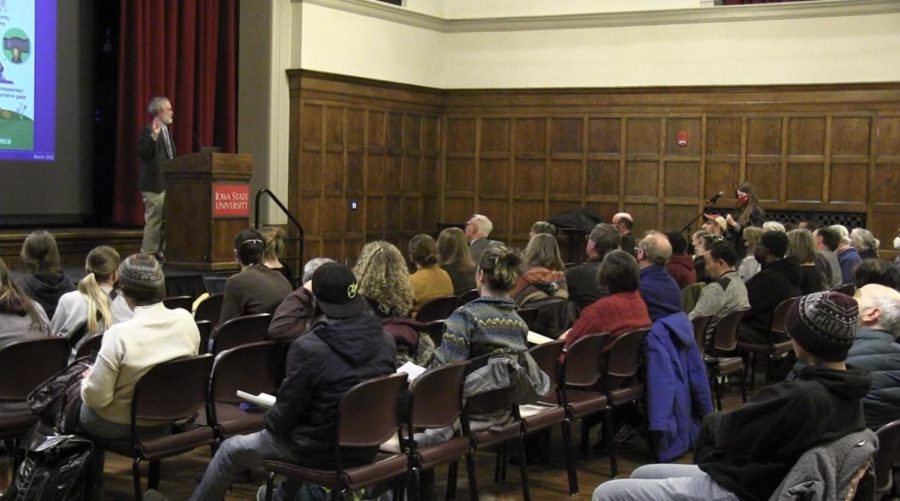Climate change at the LAS Dean’s Distinguished Lecture
By Biong Biong, [email protected]
William Gutowski took questions from those present following the conclusion of the lecture. Here, he answers a question asked by Marissa Lageveen.
March 31, 2022
William Gutowski, a professor in geological and atmospheric sciences, presented the College of Liberal Arts and Sciences Dean’s Lecture on climate change Thursday evening.
The Dean’s Lecture Series highlights faculty excellence in learning, discovery and engagement, according to the College of Liberal Arts and Sciences website.
Gutowski’s lecture focused on climate change and how the communication of scientific information is best utilized when scientists work together with communities.
“In order to write the best solutions on how to respond to [the impacts of climate change] we need to work together,” he said. “We need to recognize that everybody has a voice.”
Gutowski said that the effects of climate change could already be seen in Iowa, citing the warmer winters and humid summers.
He said future summers are expected to get hotter, and Iowa is projected to receive increased rainfall, heavy precipitation and longer dry periods.
“As the climate gets warmer, you can have more moisture present in the atmosphere, so, rain will occur when you reach saturation,” Gutowski said. “Well, if you can have more moisture present, then you gotta put more moisture to get up to that saturation level, so that means it can take longer to get to saturation. Once it does get there, you’ve got a lot of rain that can fall.”
Marissa Lageveen, a sophomore double majoring in global resource systems and environmental studies, said she enjoyed the lecture and the climate simulation models Gutowski demonstrated during his lecture.
“It’s hard to be able to determine what the weather’s going to do,” said Gutowski, “but through these simulation models you can get an idea of what it’s going to look like.”
Lageveen said even though the effects of climate change may not be visible to an individual, that individual still has an obligation to their community.
“Whether or not you believe climate change is real, there are things that you should and could be doing,” said Lageveen. “Even if you don’t give a shit about the climate, you should still give a shit about your neighbor.”
Lageveen also commented on the impacts of where consumers choose to source their products, using fast fashion as an example.
“You only paid $5, but somebody else over there is paying that external cost,” Lageveen said. “External costs as in they’re paying with low wages, poor work environments, but we only paid $5 and they got 50 cents.”
Lageveen said that everybody has a role to play, regardless of whether or not they are impacted.
“[Climate change] affects everybody. It doesn’t just affect one specific region or group of people. This is something that impacts us all. Maybe not equally, but eventually everyone will feel the effects of it.”







